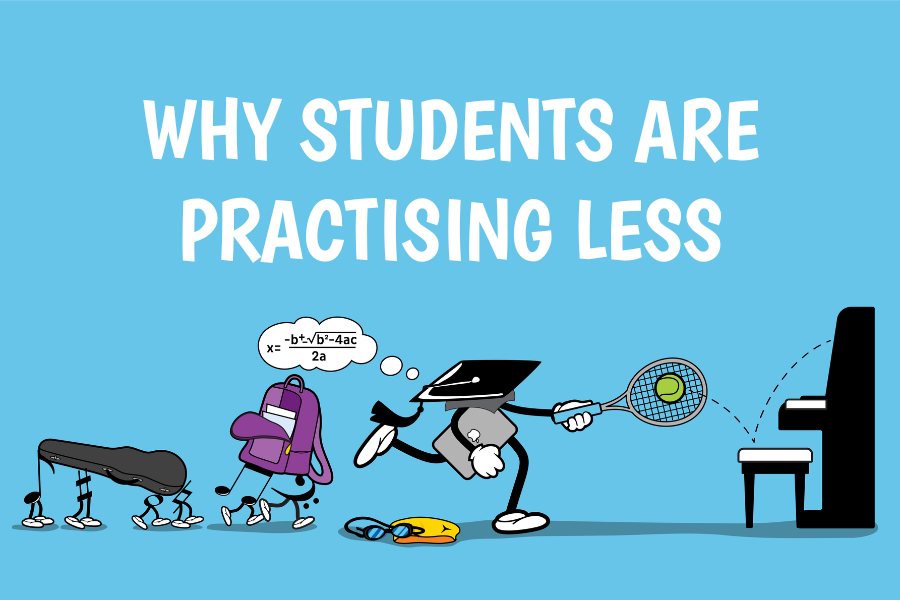Why Students are Practising Less

A LITTLE HEADS UP: I’ve used the British-Australian spelling for this blog post, which is practice with a ‘c’ for the noun and practise with an ‘s’ for the verb. 😊
Do your students practise enough?
Mine don’t.
There, I said it! My students don’t practise 1. And by ‘don’t’, I mean ‘hardly’. And I’m talking about my student base as a whole; whilst I have one or two students who work a bit harder, overall there is definitely not enough practice going on.
But here’s the really great thing: I have stopped getting upset about it.
Before I pass on my secret 2 to how we can all be less upset and we can all help our time-poor students to feel better, I can tell you that I am a normal piano teacher with normal self-esteem issues. I feel intimidated when I see YouTube videos of amazing young prodigies. I find myself thinking, ‘Wow, how come none of my students practise that much? 3
In my studio, the lack-of-practice problem has been getting steadily worse over the past 5-10 years, and every teacher I speak to is finding the same 4. So, WHY are students practising less? Are they less interested? Is piano less appealing? Do students think they can just do it without practising as much?
I don’t think so. In the demographic in which I teach, there seem to be three main reasons:
- They have no time.
- They have hardly any time.
- They are time-poor.
My students barely have enough time to attend their lessons, let alone practise piano at home. They’re coming to me in a tight window of their day, sandwiched between school and tutoring, or tutoring and swimming, or any number of extra-curricular activities. The teenagers especially seem permanently tired, and they are barely through the front door before they’re apologising that they ‘haven’t practised much.’5
Ok, so what can we do about this? I think there are two strategies we can employ.
The first is to evolve our expectations, and the second is to change the language we use with our students.
Two Caveats
I should probably mention that none of my students do exams, except for those doing HSC (final year of high school). I know many teachers who are sometimes at breaking point with students who are going for an exam and not putting in the required practice. That’s a really different situation and one that needs careful handling.
I should also say that I have a thorough onboarding system, so all of my students have supportive parents and understand the importance of practice. This article is not about how to deal with lazy students; it is about how to retain our lovely, well-intentioned students who cannot fit in the amount of practice we would all like.
Evolving our Expectations
Whilst it’s wonderful when students show up having practised, these days I’m simply delighted that they show up. I have a stack of activities up my sleeve, all with huge learning curves, and the lesson is always stimulating and challenging. In fact, I’m often secretly delighted when they haven’t practised, because it means we get to do things we never usually have time for!
I use my rote repertoire series almost every lesson, with every student – it is the best way to simultaneously cover sight reading, aural, theory, and creativity. I never repeat content from the previous week, unless the student specifically asks for this.
The mantra in my head is this: Slow progress is still progress. They learn more being here than not being here, regardless of what’s going on at home. As long as the student understands and accepts that progress will be slower with less practice, and the parent’s expectations are also managed, everyone is happy.
Changing our Language
I never start off the lesson asking them how much they’ve practised. After the initial icebreakers, I might ask ‘what piece did you enjoy the most this week?’ or ‘did any of your pieces give you some trouble?’ or even ‘if you had had more time, what would you have wanted to play?’
With teens and adults, who are the main apologists, I say things like ‘I am not here to judge you.’ I know they’re doing what they can, when they can. I want them to think of their lessons as problem-solving sessions, and I do not want them to feel guilty. When we start the lesson, I might say ‘which problem areas would you like to work on today?’
I try not to make judgments on the difficulty level of pieces. Instead of saying ‘this piece is too hard’, I’ll say ‘this piece has lots of technical issues and will take quite some time to learn.’ Talking about how much time investment the piece needs is more helpful for the student.
Rather than suggesting pieces that are ‘easier’ we can use phrases like ‘more accessible’ or ‘achievable in your time frame’.
I think the best line I’ve ever come up with is the one I use for my HSC students, who often aspire to pieces that are way too time-consuming to learn. I tell them: ‘You are totally capable of learning this piece. The problem is not your ability. The problem is your AVAILability.’ This phrase seems to disarm them; they realise they COULD achieve more if they had more time. If they cannot change their routine, that’s ok… just change the piece to something more manageable.
In conclusion
Students are practising less because, in 99% of cases, they have so much to fit in and just not enough time to do it all. Since this problem is not going away, we need to evolve and change with the culture. By adjusting our language and by managing expectations, we can not only retain our time-poor students, but help them to grow up to be holistic musicians who remember their piano lessons not as stressful weekly events, but as an activity that provided a safe space to grow and learn, and put a smile on their face.
- I personally feel there are too few teachers who will admit to this!
- It’s no secret, that’s just normal clickbait-y phrasing. Wait til you read the end of this article! 😊
- And then I make myself snap out of it.
- Except for the ones who won’t admit it.
- This is a euphemism for ‘I haven’t touched the piano this week.’

Really helpful, Sam. I love the alternative lines for enquiring about practice.
Thanks Karen!
Pingback: Friday Finds #259 - Piano Pantry
What I great article! I’ve been teaching for over 40 years and I too have noticed a decline in practice. I thought it was primarily my students (wealthy suburb with tons of activities) who were havin trouble finding time to practice. I’m teaching online so at least the kids don’t have travel time. I’ll try your books when my fall semester begins. Thanks!
Thanks Sandi – I’m glad it resonated!
I was wondering why none of your students do exams?
Hi Penny, I find that the exam syllabuses on offer are extremely limiting. Ultimately there is nothing assessed that goes towards recreational music making skills.
I was curious because you write books that align with these syllabuses. But I agree with your comment about assessment for recreational music skills. Something to think about.
Thank you Samantha,
So very true – and I loved your solution – to having to tailor our expectations of how much our students practise – because I agree so much is already being expected from them in the way of extra-curricular activities that they just have little time left over. I loved your way of approaching what they have done. Thank you I have learned so much from your article. I have bought quite a few of your rote repertoire pieces and am really looking forward to using them this year. Thank you for all your brilliant ideas.
Thank you Melody, your comment has made my day! 🙂
Thank you for this article, I loved reading about the struggles most teachers are having with their students practicing. It takes off the pressure to expect so much but to try and make it an enjoyable learning experience when they have made the effort to show up for their lesson. What great advice. Thank you!
Thank you for your lovely feedback Lohnay! 🙂
Thanks Sam for this realistic article. Your students are lucky to have an understanding teacher whose primary focus is enjoyment. I no longer teach, but still read your articles with interest.
Thank you Anne!
I find that asking my students if they have exercised their piano any time this week makes them smile. At least,did they pat iit as they ran past? Some students will then tell me they stopped to pat their piano but then sat and played one piece on it before they dashed off to their next activity.
Wonderful!
I (unashamedly passive-aggressively) sang “Think of Me” from Phantom of The Opera to a student on his way out the door. He immediately understood and responded, “As in think of the piano? Think of practicing the piano?” I said, Yes, Please! I love the comment from the reader who asked about patting the piano. I might even expand that to likening your piano ability to being a plant. Did you feed or water your piano skills this week?
Fabulous idea Cynthia!
Thanks for this article Samantha! I’m sure it resonates to everyone as we all have to face students with tonnes in their plates through the week.
Very often we take it personally when students don’t practice and this article reminds us to take a step back and be whole again in our demeanor and look at our own self care again.
I teach exam syllabus and do agree that there’s little time to do other creative things like the rote pieces and also games to cultivate musicality and curiosity. The bottom line is that by stepping back we become whole again and get to treat our students in a more holistic manner.
So very true Ken!